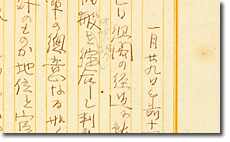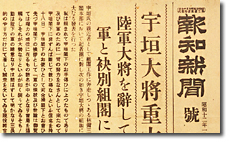HOME > Crisis in Constitutional Politics > b. Rise of the Military > Stillbirth of the UGAKI Cabinet
4-8 Stillbirth of the UGAKI Cabinet

Army General UGAKI Kazushige announcing his declining of the Imperial Order to form a cabinet From "Showa Niman'nichi no Zen Kiroku. Vol.4"
On 23 January 1937 (Showa 12), the HIROTA Koki Cabinet resigned en masse, and at dawn on 25 January, Army General UGAKI Kazushige was commanded to form a new cabinet. UGAKI, who was biding his time in selecting Cabinet members, faced an unexpectedly great backlash from the Army. Colonel ISHIHARA Kanji of the General Staff Office became the core of an effort to reject the nomination of UGAKI as Prime Minister, citing the suspicion of UGAKI's involvement in the March Incident (the abortive coup d'état), as well as his supposed unsuitability for being the person to revitalize politics owing to his deep links with the political parties and the Zaibatsu. At a meeting of the three top Army officers, then, it was decided not to recommend any individuals to become the next Army Minister. Without being able to secure an Army Minister, UGAKI could not form a cabinet (the HIROTA Cabinet's earlier revival of the system that only active duty officers could serve as Army and Navy Ministers, now become an insurmountable hurdle). UGAKI had even considered seeking Imperial intervention in the matter to effect a breakthrough, but was unable to take that step. On 29 January, UGAKI formally withdrew his nomination as Prime Minister.
In his memorial declining the Imperial Order to form a cabinet, UGAKI writes of the circumstances surrounding his abandonment of the quest to form a cabinet, saying that it caused him "great regret that the Imperial Order to form a cabinet had been obstructed by Your Majesty's Army." His aide Lieutenant General HAYASHI Yasakichi also spoke the same day to reporters about a conversation with UGAKI, who had criticized the obstruction of his formation of a cabinet as "perhaps a violation of Imperial will." That article, however, was banned from publication by censors.
On 2 February 1937 (Showa 12), General HAYASHI Senjuro, endorsed by the Army, became Prime Minister. After the events of the preceding week, the military realized that it could take advantage of the system of requiring only active duty officers to serve as Army and Navy Ministers, frequently wielded it as a mean to topple cabinets or render them stillborn, thus gaining an even greater say in the nation's political affairs.
Memorial Declining the Imperial Order to Form a Cabinet (Manuscript)
- January 29, 1937 (Showa 12)
- Papers of UGAKI Kazushige, #150
- National Diet Library
"Extra!", Hochi Shinbun
- January 29, 1937 (Showa 12)
- Constitutional Government Documents Collection, #1173
- National Diet Library

